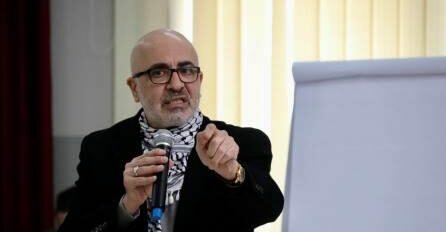Written by: Bakr Abu Bakr
US President Joe Biden's visit to the region was full of expectations and assumptions. Some say or analyze that it will establish an Arab-Israeli NATO, and some say that it is the beginning of the end for the Arab nation that has begun to drift towards full normalization with Israel without the slightest regard for the Palestinian cause. On the other hand, many considered that political-economic interests should prevail among the countries of the region, including Israel. Without a knot! And the Arab countries know what they are doing.
Dissenting voices from the foreign press, especially the American ones, focused on the US domestic situation and what President Biden could achieve in this regard, as he talked about in his article in the "Washington Post", and later in his references in Jeddah, about confronting his main enemy China and Russia, and interest in energy, supply chains and corridors, and elections. He has, and uniting the region in the face of the rising global power and against Iran, in addition to his relentless pursuit to establish Israel as a pivotal central power in the region.
There is no doubt that the idea of shaking hands with the Saudi crown prince was a matter of discussion, according to the habit of foreign newspapers, which make the other tense and stand on one foot, so that he gives his best in advance to satisfy the upcoming American power as the wind sweeps the region, unless it happens from the Saudi crown prince.
Between preserving Israel's security and continuing its support, which is an American policy since US President Wilson's approval of the Balfour Declaration in 1917, the idea of Arab normalization that the American seeks with the Israeli makes the American, like the Israeli, gradually degrade from playing his role in the Palestinian cause, in an effort to reverse It is in Arabic.
What happened from the visit of the American president to the region proved beyond any doubt 4 main important points that can be built upon:
First: The official and bipartisan American bias towards Israel is a decision that is at the heart of American national security, and there is no dispute about it for them. Rather, offers vary and play on the same chord of strengthening Israel’s strength, dominance and security in the region in one way or another, despite some fair American leftist voices.
As for the second point, his tour in the Arab region proved that the Arabs, despite their weakness and differences, still consider Palestine or the Palestinian cause as one of their affairs, even if this was expressed in varying forms of indolence, moderation, or shy withdrawal. What appeared in the words of the princes and presidents at the Jeddah summit, and that is only because The cause is just, and no leader will be able to cross the necks of all the worshipers to jump into the first ranks without Palestine, no matter what he does or thinks that he is serving his throne, his people, or his nation.
As for the third result, it is that the Palestinian demands remain the same since the Arab and Palestinian opinion settled on the interim solution, represented by the optimal and politically accurate formula, i.e. the independence of the State of Palestine - based on a natural, historical and legal right - under occupation, which is arguably expressed in the name of the two-state solution.
As for the fourth, and perhaps the American’s surprise is that all signs of contempt or disdain and disrespect for the Arabs have been reflected against him, the nation, despite all that is said, has come to understand its interests well. In general, in my opinion, he saw signs that he did not like. If economic interests are the rule, then we have interests with Russia, China and Iran.
Chaim Weizmann, the first president of Israel, said in one of his speeches: “The Arab, through his laziness and naivety, turns the flourishing orchard into a desolate desert!” And I do not think that the American-Zionist who is proud of his Zionism has only witnessed the falsehood of this saying, which requires us to build the Arab wall of support strongly, and to move and not keep the region in the vacuum of Arab estrangement or separation, by enlarging the factors of agreement and expanding the spaces for meeting, because Palestine is greater than all of us.








Share your opinion
Four points in Biden's visit